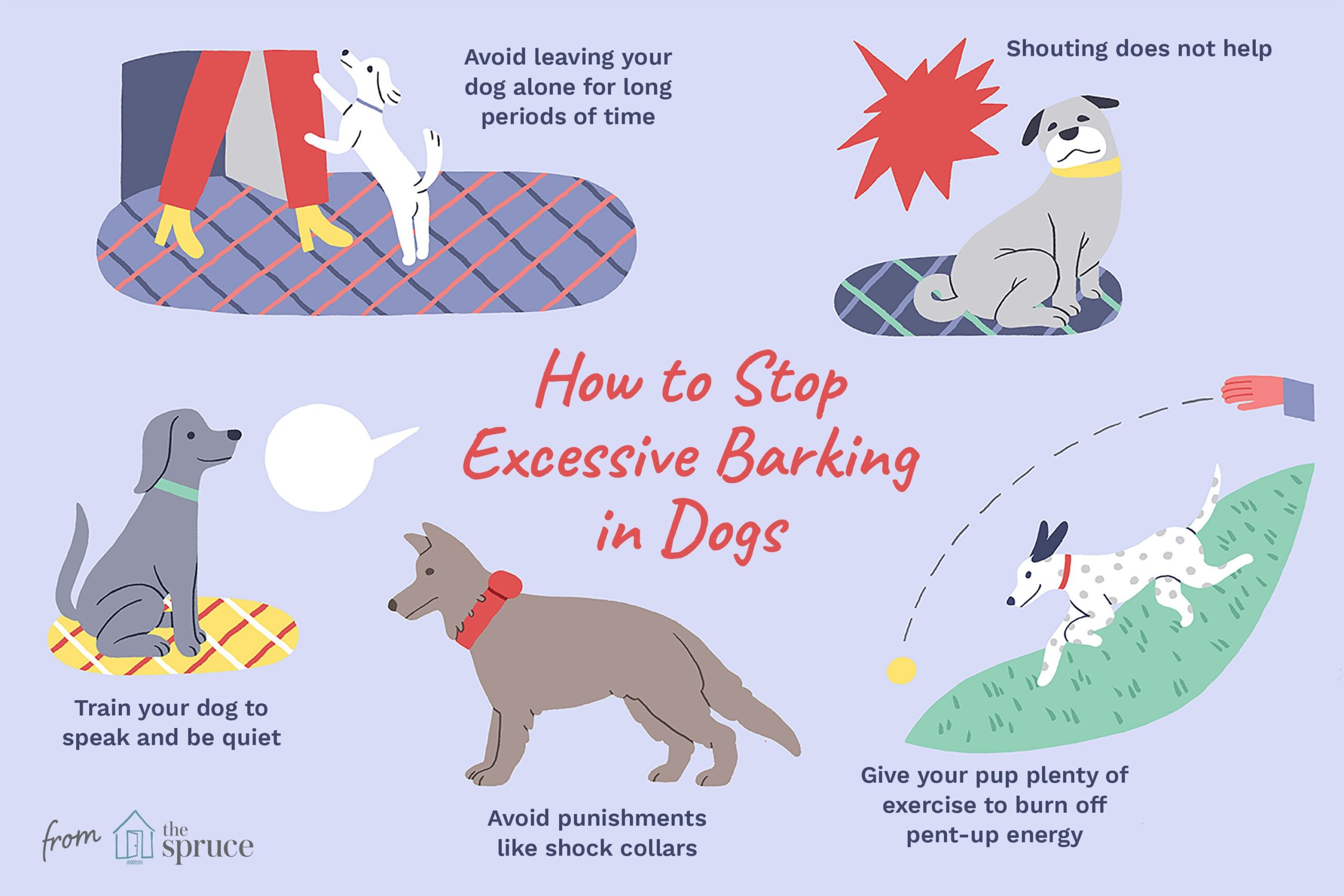Key Takeaways:
- Identify the cause of excessive barking to effectively address the issue.
- Provide adequate physical and mental stimulation to prevent boredom and reduce excessive barking.
- Consistently use positive reinforcement training techniques to teach your dog alternative behaviors.
- Manage your dog's environment by removing triggers or using noise-canceling devices to minimize barking.
- Consult a professional trainer or behaviorist if the excessive barking persists despite your efforts.
Is your furry friend driving you crazy with their incessant barking? Are you desperate for some peace and quiet in your own home? Well, look no further! In this article, we will delve into the fascinating world of dog behavior and reveal the secrets to stopping your dog from barking excessively. By understanding the reasons behind their barks and learning effective techniques to curb this behavior, you can finally regain control of your home environment. So, get ready to discover the key to a harmonious household where both you and your beloved canine companion can live happily ever after. Let's dive in!
Why is my dog barking too much?
Excessive barking can be frustrating for both you and your furry friend. It's important to understand why your dog might be barking so much so that you can address the issue effectively. Dogs bark for various reasons, including:
- Alerting or warning: Dogs have a natural instinct to protect their territory, and they may bark if they sense something unusual or threatening.
- Boredom or loneliness: Dogs are social animals and may bark excessively if they are not getting enough mental stimulation or companionship.
- Anxiety or fear: Some dogs may bark excessively when they feel anxious or scared. This could be triggered by separation anxiety, loud noises, or unfamiliar situations.
Noise sensitivity
Some dogs are more sensitive to certain sounds than others. For example, fireworks, thunderstorms, or even the doorbell ringing can cause them to bark excessively. This is known as noise sensitivity and can be managed with training techniques and desensitization exercises.
Lack of exercise
Dogs need regular physical exercise to burn off excess energy. If your dog isn't getting enough exercise, they may resort to excessive barking as a way to release their pent-up energy. Make sure your dog gets daily walks and playtime to help reduce their barking behavior.
Common reasons for excessive dog barking
In order to address excessive dog barking, it's important to identify the underlying cause. Here are some common reasons why dogs bark excessively:
- Territorial behavior: Dogs naturally want to protect their territory and may bark excessively at people or animals they perceive as intruders.
- Attention-seeking: Dogs may bark excessively to get attention from their owners. If they learn that barking gets them what they want, they will continue the behavior.
- Separation anxiety: Some dogs become anxious when left alone and may bark excessively as a result. This is often accompanied by other signs of distress, such as destructive behavior or house soiling.
Training issues
In some cases, excessive barking can be attributed to training issues. If a dog hasn't been properly trained to understand when it's appropriate to bark and when it's not, they may bark excessively in various situations.
Lack of socialization
Dogs that haven't been adequately socialized may be more prone to excessive barking. When dogs are exposed to different people, animals, and environments at an early age, they learn how to behave appropriately and are less likely to bark excessively out of fear or anxiety.
Teaching your dog to stop barking too much
If your dog is barking excessively, it's important to teach them alternative behaviors and provide them with appropriate outlets for their energy. Here are some training techniques you can use:
- Positive reinforcement: Reward your dog with treats or praise when they exhibit calm behavior instead of barking. This will help them associate quiet behavior with positive outcomes.
- Ignore the barking: If your dog is barking for attention, avoid giving them any response or eye contact until they stop barking. Once they are quiet, reward them for their silence.
- Teach the "quiet" command: Train your dog to understand a specific command like "quiet" or "enough" that signals them to stop barking. Use treats and positive reinforcement to reinforce this command.
Seek professional help
If your dog's excessive barking persists despite your training efforts, it may be beneficial to seek the assistance of a professional dog trainer or behaviorist. They can provide personalized guidance and develop a training plan tailored to your dog's specific needs.
Avoid punishment
Avoid using punishment as a means to stop excessive barking. Punishment can create fear and anxiety in dogs, potentially worsening the problem or causing other behavioral issues.
Effective training techniques to reduce excessive dog barking
Reducing excessive dog barking requires consistent training and patience. Here are some effective techniques to help you achieve that:
- Desensitization: Gradually expose your dog to the triggers that cause them to bark excessively, starting at a distance where they remain calm. Reward them for staying quiet and gradually decrease the distance over time.
- Counter-conditioning: Pair the presence of the trigger that causes excessive barking with something positive, such as treats or playtime. This helps change their emotional response from fear or anxiety to a more positive association.
- Bark control devices: There are various devices available, such as citronella collars or ultrasonic bark deterrents, which can help interrupt and discourage excessive barking. However, these should be used in conjunction with training rather than relying solely on them.
Maintain consistency
Consistency is key when training your dog to reduce excessive barking. Make sure everyone in your household follows the same rules and uses consistent commands and rewards. This will help reinforce the desired behavior and avoid confusion for your furry friend.
Patience and persistence
Changing a dog's behavior takes time, so it's important to be patient and persistent. Stick to your training routine and remain consistent in your approach. With time and consistency, you can help your dog overcome their excessive barking habits.
Strategies to prevent unnecessary dog barking
Preventing unnecessary dog barking involves creating an environment that minimizes triggers and provides appropriate outlets for your dog's energy. Here are some strategies to consider:
- Create a routine: Establish a daily routine for your dog that includes regular exercise, mental stimulation, and socialization. This helps prevent boredom and reduces the likelihood of excessive barking.
- Provide enrichment: Use puzzle toys, interactive feeders, or chew toys to keep your dog mentally stimulated. This can help redirect their focus from barking to more constructive activities.
- Manage the environment: Identify what triggers your dog's excessive barking and take steps to manage or eliminate those triggers. For example, if your dog barks at people passing by the window, close the curtains or move them to another room during peak activity times.
Avoid reinforcing unwanted behavior
Avoid unintentionally reinforcing unwanted barking behavior by not giving in to demands for attention or responding anxiously when they bark excessively. Instead, reward calm behavior and provide attention when they are quiet.
Consider professional help
If you're struggling to prevent unnecessary barking despite your best efforts, consider seeking professional help from a certified dog trainer or behaviorist. They can assess the situation and provide tailored advice based on their expertise.
Do certain dog breeds bark more and why?
Some dog breeds are more prone to excessive barking due to their genetic traits and characteristics. However, it's important to note that individual dogs within a breed can vary in their barking tendencies. Here are some dog breeds known for being more vocal:
- Chihuahua: Chihuahuas are known for their big personalities and tendency to bark at anything they perceive as a threat or intrusion.
- Beagle: Beagles have a strong sense of smell and were originally bred for hunting. They may bark when they catch an interesting scent or if they're bored.
- Siberian Husky: Huskies are known for their howling, which is a natural form of communication. While not excessive barkers, they can be vocal when expressing themselves.
Small dog syndrome
Small dog breeds, in general, tend to be more vocal compared to larger breeds. This is often referred to as "small dog syndrome" and can stem from their protective nature or desire for attention.
Breed-specific tendencies
It's important to research the specific tendencies of any dog breed you're considering bringing into your home. Understanding the breed's predisposition towards barking can help you make an informed decision that aligns with your lifestyle and preferences.
Potential health issues causing excessive dog barking and what to do
In some cases, excessive barking can be a sign of underlying health issues in dogs. If you've ruled out other causes and your dog continues to bark excessively, it's important to consult with a veterinarian. Here are some potential health issues that could contribute to excessive barking:
- Pain or discomfort: Dogs may bark excessively if they are experiencing pain or discomfort. This could be due to an injury, dental issues, or other medical conditions.
- Cognitive decline: Older dogs may develop cognitive decline, similar to Alzheimer's disease in humans. This can cause confusion and anxiety, leading to excessive barking.
- Thyroid problems: Imbalances in thyroid hormones can affect a dog's behavior and lead to excessive barking. A veterinarian can conduct blood tests to diagnose and treat thyroid issues.
Visit the veterinarian
If you suspect that your dog's excessive barking is due to a health issue, it's important to schedule a visit with your veterinarian. They can perform a thorough examination and recommend appropriate treatment options if necessary.
Behavioral vs. medical causes
A veterinarian will help determine whether your dog's excessive barking is primarily behavioral or has an underlying medical cause. This distinction is crucial for developing an effective treatment plan.
In conclusion, excessive barking in dogs can be addressed by understanding the reasons behind it and using positive training techniques. By providing proper exercise, mental stimulation, and consistent training, you can help your dog become a well-behaved, quieter companion.
How do I stop my dog from obsessively barking?
If your dog is barking excessively, it is important to ignore the barking and instead focus on rewarding the moments of quiet and positive behavior, such as playing with toys or engaging in training exercises. When your dog stops barking, show praise and provide a reward. While your dog remains quiet, continue to interact and play with them or work on training exercises.
What causes dogs to bark excessively?
There are various reasons why dogs may bark excessively, such as boredom, loneliness, fear, frustration, or separation anxiety [1,2].
Should I let my dog bark it out?
Barking loudly may not be an effective solution and does not address your dog's fear. Instead, there are specific training methods available to help you manage your dog's barking. It is recommended to teach your dog an alternative behavior to replace the barking, particularly if the barking is a result of fear.
Which dog breed barks the most?
According to People Magazine, Samoyed dogs are known to bark the most, with an average of 52.8 barks per day based on data collected from Furbo users. The Yorkshire Terrier, the second most vocal breed, barks significantly less at around 23.6 times per day.
Does excessive barking hurt a dog?
When a dog barks continuously throughout the day, it can cause pain in their throat and may even result in inflammation of the larynx. This condition requires medical attention from a veterinarian. It is important to avoid putting your dog in situations that cause them enough stress to bark excessively.
Does peanut butter stop dogs from barking?
Many dog trainers use peanut butter as a tool to manage dogs that tend to bark during group training sessions. By sticking the dog's tongue to the roof of its mouth, the owner has an opportunity to reward calm and polite behavior.

















